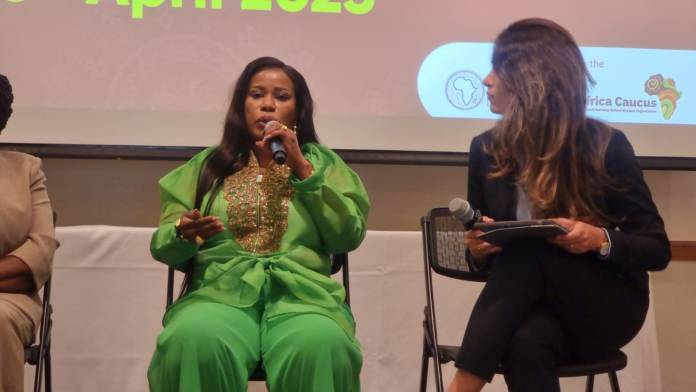The Chief Executive Officer of American International School, Mrs. Adelaide Siaw-Agyepong, has observed that Africa needs people who are sustainable development oriented to transform the continent.
According to her, the changing world needs people who are analytical in view and poised in thoughts to make an impact on this world.
Speaking on the topic “Rising to Africa’s education challenges and opportunities post COVID-19 pandemic” at the 2023 edition of the Africa Development Conference organized by the African Caucus of the Kennedy School of Law and Harvard African Law Association, Mrs. Siaw-Agyepong noted that the changing world does not need people who have mere knowledge and can regurgitate principles on the internet through multiple search engines and can perform the same thing.
“We need persons who are aligned with sustainable development, responsible business conduct, and laced with humanity because knowledge that does not consider the survival of humanity and the generations to come are as treacherous as no knowledge,” she stressed.
She explained that, as such “a wholistic education is needed and is one that uses knowledge to solve every day problems, recognizing the survival of humanity as dependent on the survival of one and all and works towards improving our individual and collective lives”.
“The world needs people who are ready to learn unlearn and relearn,” she stressed.
Touching on how private schools in Ghana adapted and mobilized resources to aid teaching and learning in the educational sector during the COVID-19, Mrs. Siaw-Agyepong observed that during the COVID-19 pandemic, the private schools had to quickly adapt and mobilize resources to aid teaching and learning.
She added that most private schools transitioned to online learning platforms by creating online learning platforms to provide students with access to learning materials and resources from home. “These platforms often included features like video lectures, interactive quizzes, and virtual classroom discussions,” she added.
She also noted that private schools and educational companies provided students with learning materials like textbooks, workbooks, and worksheets to enable them to continue learning at home. “Some also provided technology devices like laptops and tablets to students who did not have access to them,” she added.
During the period also, some private schools and educational companies provided training for their teachers to enable them to adapt to the new online learning environment. This training often included how to use online teaching tools, how to conduct virtual classroom discussions, newsletters and how to provide feedback and assessments online. This improved communication.
“Private schools and educational companies invested in technology to ensure that students had access to the necessary devices and internet connectivity. This often-included purchasing laptops, tablets, and other devices for students and providing internet connectivity to those who did not have it,” the CEO of American International School.
Answering a question on what changes American International School undertook to ensure that learning continued? She explained that, when it was becoming clearer that a lockdown was imminent, AIS put in place a Covid-19 taskforce which brainstormed and discussed strategies to continue teaching and learning in case that happened.
“This reinforced what we believed already. We believe students should take ownership of their learning. Hence, we constantly offer professional development to our teachers to deliver inquiry-based/ researched-based models of education. The combination of this and hybrid learning means we were ready to transition to an online classroom when needed,” she stated.
The Africa Development Conference is a student-led event that convenes academia, students, and practitioners to highlight and explore critical issues related to the African continent’s development. This year’s took place between the 15th – 16th of April, 2023, at the Harvard Law School, Cambridge, Massachusetts. The theme for this edition is “Reimagining Africa’s Growth on Our Terms.”
The Conference had panels, fireside chats, and keynote speeches on topics including how Africa can thrive in international trade, challenges and opportunities in transitioning to a green economy, the role of creative arts in development, the Africa we want, and other engaging topics.

